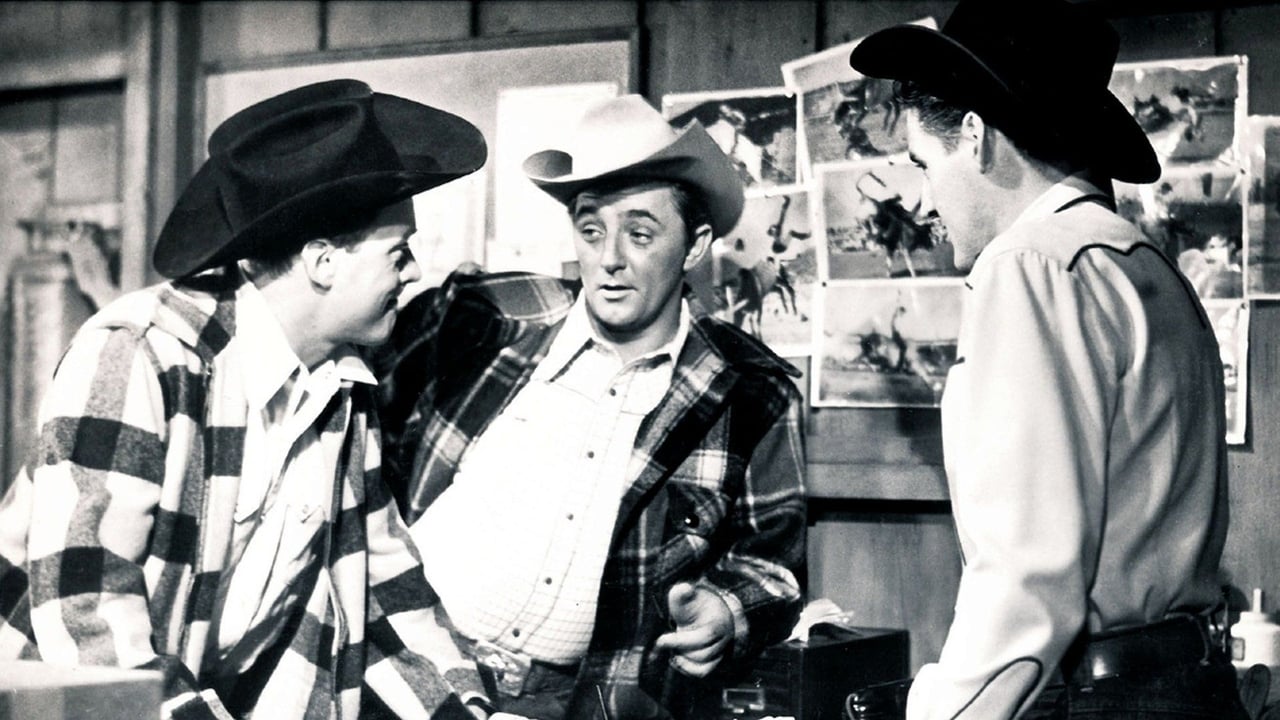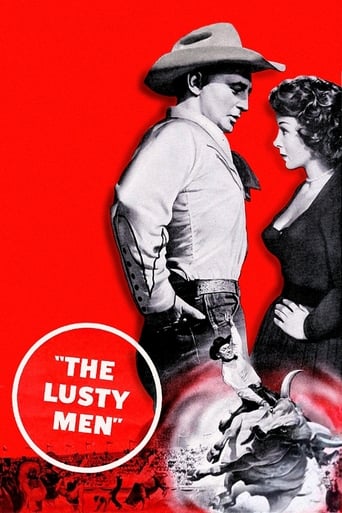



terrible... so disappointed.
Good concept, poorly executed.
After playing with our expectations, this turns out to be a very different sort of film.
View MoreThe movie really just wants to entertain people.
"The Lusty Men." What a deplorable title. Sounds as if it ought to star Audie Murphy, with Joan O'Brien as the mammus girl and John McIntyre as "the sheriff." But it's considerably better than that.Not that the plot is very original. An older guy takes a talented newcomer under his wing and the tyro gets an attitude. It could be Paul Newman and Tom Cruise as pool players or, more aptly, it's likely to have been drawn from a successful movie about boxing, "Champion," with Kirk Douglas.Nor is the acting especially outstanding. When Mitchum got his hands on the right role he could really swing, but here he's his usual sleepy self. Arthur Kennedy, as the talented newcomer, is good enough but the role itself is formulaic. With each successful appearance at a rodeo, busting broncos, bull dogging, calf roping, riding the Brahma bull (pronounced Bray-ma), his head expands along with his ego and he begins to neglect his loving and dutiful wife, Susan Hayward, developing instead a taste for drinking, gambling, and loose blonds. Hayward herself is miscast. She's not a slightly worn waitress from a tamale joint. That's Patricia Neal's role. Hayward projects toughness but I'm afraid she's Edythe Marrener from Brooklyn.It occurs to me that the film borrows from another pattern: the conflict between two partners in life, one of whom wants to settle down and the other who wants to keep moving and living the free life. Kirk Douglas was the rootless drifter in "Lonely Are the Brave," but he had no companion except his horse, Whiskey. A closer fit has Mitchum as the happy drifter and Deborah Kerr as the tough wife who longs for a farm in "The Sundowners." Crossing the line into the absurd, Bob Hope always wanted to go home to Sioux Falls and Bing Crosby kept coming up with plans to find a secret gold mine in the Road pictures of the 40s.There's another thing too. Mitchum is an ex prize winner at rodeos and he stumbles on Kennedy more or less by accident. Kennedy agrees to split any winnings at the contests if Mitchum shows him the ropes and teaches him the tricks. But we see NONE of that teaching. All I learned was that when you're aboard an animal in the chute and you want it to open, you shout "Outside!" And when you ride a bull you tie your left hand into place with a rope, but I already knew that thanks to a shipmate of mine in the service who was a kinsman of such a contestant. There isn't one second of Kennedy's practicing with a bucking horse or a laso. Plenty of scenes of the contests themselves, aimed at an audience who loves to see some guy thrown on his bum and mauled by a one-ton brute.So those are all the irritants. What lifts it above the average are the character touches, presumably from Horace McCoy's adaptation of Claude Stanush's novel. Whoever was responsible for the screenplay knew a thing or two about rodeos and what goes on behind the scenes. What goes on can be pretty retrograde. A man has to prove to himself and others that he's not "afraid." Kennedy often protests indignantly that he's not "scared" of being hurt.The other thing is Nicholas Ray's direction, to the extent that he can unshackle himself from the more banal parts of the script. Mitchum dies at the end. But he doesn't declare his love for Hayward on his deathbed. That love, which has only been intimated, goes unspoken. The death itself is bloodless. And instead of grimacing, then closing his eyes and rolling his head on its side -- the side facing the camera -- as almost all Hollywood's dying people do, he rolls AWAY from the camera onto his side and clutches Hayward's hands. The camera drifts up from Mitchum's naked back to Hayward's face. It's only from the change in her expression that we know he's given up the ghost. There are a couple of other scenes, equally nuanced, and if Ray had been able to get more out of Mitchum and had someone with brains and sensitivity buff the script, it could have been a very good movie indeed.
View MoreYes, as one commenter noted, Susan Hayward seems a bit Eastern-glamorous to be kicking up dust on the rodeo circuit. But she glowers and snarls with the best of them, and, top-billed in this man's-man movie, she's great fun. But even she's dominated by a supremely confident and virile Robert Mitchum, as a has-been rodeo champ trying to turn her husband (a rather miscast, but hard-working, Arthur Kennedy) into a king of the saddle. It's location-filmed and has no traces of studio hackery, and Nicholas Ray keeps it wonderfully outdoorsy, with some fabulous stunt-riding footage and an authentic atmosphere of the hardscrabble rodeo life. The initial Hayward-Mitchum shower scene has to be one of the sexiest in all 1950s cinema, and there's a great sexual undercurrent to all their encounters. Kennedy seems a little pallid by comparison, and is playing a character that's hard to root for, but he does try hard. I didn't know this movie and am grateful to TCM for running it -- it's a real discovery. However, their print has awfully uneven sound, and you'll have to keep adjusting your volume up, down, up, down.
View MoreAfter viewing this film, it is truly a great 1950's classic with outstanding acting by the entire cast; and a great story with a realistic view of what the Rodeo life really is and the pain and suffering that is experienced by men and woman. Robert Mitchum(Jeff McCloud),"Farewell',My Lovely",'75, played a real calm cool veteran star of the Cowboy game shows and was very successful, but was beginning to show wear and tear. Arthur Kennedy, (Wes Merritt),"Peyton Place",'57, was originally a ranch hand trying to buy his dream house for his wife Louise Merritt,(Susan Hayward),"With A Song in My Heart",'52, and loved her husband very much. However, when Wes Merritt got together with Jeff McCloud, all hell broke loose and Louise did everything she could to hog tie her husband down from very hot women, wild horses, and bulls with angry tempers. Great film, don't miss it, it will be around for many generations to enjoy.
View MoreNicholas Ray had always been fascinated by the relationship between two guys,the older one and the younger one.That was the story of "rebel without a cause" and "run for cover".Even in "Johnny Guitar",there 's a subplot displaying a relationship of the same kind between Johnny(and Emma) and Turkey.This is a cyclic movie ,beginning with a rodeo ,and ending the same way.A recurrent subject is the childhood nostalgia:Mitchum searching for his old rusty money-box in his parents house echoes Dean with his toy in the gutter in the opening scene of "rebel".Robert Mitchum , the stand-out of the film,portrays a cowboy down on his luck who meets another cowboy(Kennedy) and his wife (Hayward).He urges him to ride the rodeo,to make his dream come true:buying a ranch.The depiction of this cruel world is devoid of leniency:we're far away from that of ,say,"Bus stop".And in this man's man's man's world,Ray does not forget the women in the shadow,who hide their fears,suffer and cry.If they made a remake ,I'm sure their parts would be passed over in silence.Women in Ray movies are strong:Crawford in "Johnny Guitar" ,Gardner in "55 days at Peking" and even young girls like Wood in "Rebel" and O'Donnell in "they live by night".One can wonder whether this is an optimistic or a pessimistic ending.Most of Ray movies include death,but from this death,something new is born.Death is almost necessary to allow the others to go on.In "rebel',Wood and Dean reconcile with the adults who have understood Plato/Mineo's plight and near sacrifice;in" Johnny Guitar",monstrous Cambridge's shooting allows Crawford and Hayden to pick up the pieces;in "55 days at Peking",it's Gardner's sacrifice-while trying to help the children-who will lead Heston to adopt the little Chinese orphan girl.Here ,Mitchum did not die in vain: the young couple is now armed against life's harshness.
View More